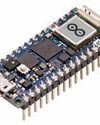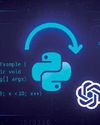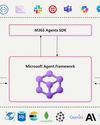Denemek ALTIN - Özgür
MetaKey: Physically Securing the Virtual World
Open Source For You
|September 2022
This article discusses MetaKey, a unique solution for identity management and authentication in the Metaverse.

The Metaverse offers a collection of virtual reality ‘worlds’ for interaction, communication, teamwork, gaming, entertainment, and other purposes. In the Metaverse, each entity is authenticated on a virtual platform, making it a very secure world. It encourages multilingual communication both locally and internationally.
The education sector stands to benefit greatly from the Metaverse. The pandemic has demonstrated how simple it is to implement online education using platforms for streaming video, together with other systems that facilitate tests, assignments, and other things that are associated with the educational system. However, the absence of laboratories on these video-sharing platforms does hinder the students’ practical knowledge. This shortcoming can be addressed in the Metaverse, where laboratories can exist and tests can be carried out in the same way as is done in the real world. Of course, the technology we currently have does limit such laboratories. For instance, understanding how different compounds smell is crucial while learning chemistry. With the technology we have today, this is impossible.

Figure 1: Representative image of Metaverse
Bu hikaye Open Source For You dergisinin September 2022 baskısından alınmıştır.
Binlerce özenle seçilmiş premium hikayeye ve 9.000'den fazla dergi ve gazeteye erişmek için Magzter GOLD'a abone olun.
Zaten abone misiniz? Oturum aç
Open Source For You'den DAHA FAZLA HİKAYE

Open Source For You
Lux: Excellence in Data Analysis and Visualisation
Data is sacred in today's world, and Python libraries like Lux make data analysis and visualisation so much easier.
2 mins
January 2026

Open Source For You
The Role of Open Source in Building Modern Data Infrastructure
It's no secret that open source is emerging as the backbone of modern data infrastructure. Here’s a list of the core open source technologies used to deploy this infrastructure, along with some real-world examples and a brief on why open source matters.
3 mins
December 2025

Open Source For You
The Whispering Machines: How Open Source is Bringing Intelligence to the Tiniest Devices
Built on open source frameworks, TinyML is enabling complex machine learning models to run on the microcontrollers embedded in connected devices, bringing artificial intelligence to the very edge of the network.
3 mins
December 2025

Open Source For You
Setting Up Snort to Secure Your Network
Snort is a popular, open source intrusion detection system that monitors traffic in real time to detect malware. Here’s a detailed explanation of how to set it up on Ubuntu and test it by generating traffic from another system.
7 mins
December 2025

Open Source For You
When AI Meets DevOps to Build Self-Healing Systems
Traditional DevOps, with its rule-based automation, is struggling to work effectively in today’s complex tech world. But when combined with AlOps, it can lead to IT systems that predict failures and solve issues without human intervention.
7 mins
December 2025

Open Source For You
How to Automate Java Code Modernisation
This short guide illustrates that automating Java code modernisation with Python and OpenAI API is not just possible-it's remarkably effective.
5 mins
December 2025

Open Source For You
The Quest to Build a Quantum Computer
The road to large-scale quantum computing is long and hard, with incremental advances paving the way. But the destination is in sight.
12 mins
December 2025

Open Source For You
Job Opportunities: What's Hot in the Cloud Space?
If there's one field that refuses to slow down, it's cloud computing. Even as automation and AI reshape roles, cloud adoption continues to surge. From startups deploying microservices overnight to enterprises migrating decades of legacy systems, cloud remains the engine of digital transformation. For professionals, this means one thing: skills that live in the cloud won't come down anytime soon.
2 mins
December 2025

Open Source For You
Securing Client Identity with Post-Quantum Cryptography
Here's a quick tutorial on how to build a secure, real world client-server model that establishes client identity by using CRYSTALS-Dilithium, a post-quantum cryptography algorithm.
3 mins
December 2025

Open Source For You
Unlocking the Power of Multi-Agent Solutions with the Microsoft Agentic Framework
The Microsoft Agentic Framework is rapidly emerging as a cornerstone for developers, architects, and technology leaders seeking to build dynamic, intelligent systems powered by multiple collaborating agents. In an era where automation, distributed intelligence, and adaptive software are increasingly vital, this framework offers robust tools and features to accelerate the design and deployment of agent-based solutions.
6 mins
December 2025
Translate
Change font size

